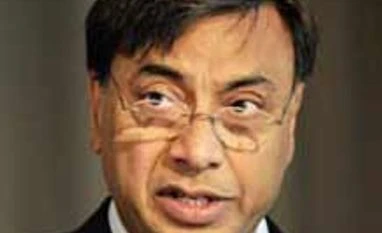The South African arm of Indian steel magnate Lakshmi Mittal's business empire has received a bailout from government interventions after earlier being at loggerheads with it over a closure that would have effectively destroyed an entire town that depended on it.
In July this year, Mittal was reported to have been in urgent talks with the same South African government which sold its steel company Iscor to him a decade ago to come to his rescue amid huge challenges facing the international steel industry.
At the time, ArcelorMittal SA (AMSA) had asked for rescue assistance without which it would have been forced to close down plants in at least two South African towns where the entire economy is dependent on the steel industry.
But now residents are breathing a sigh of relief after several steps in the past week will result in AMSA continuing to operate, among them government bailout on tariffs and a plan by AMSA to raise 4.5 billion rand through a rights offer.
The government has committed to introducing a 10 per cent tariff on all steel entering South Africa by January, with further anti-dumping duties of over 30% by March next year that will effectively end cheap Chinese imports which have threatened to close down the local steel industry.
South Africa has also agreed to introduce policies to ensure that local steel content is used in infrastructure building programmes, which has been absent until now.
In return for the government concessions, AMSA will introduce a five-year fair pricing model for its products, which have been sold at import parity pricing until now.
This issue, as well as a lack of bringing in Black Economic Empowerment (BEE) plans for previously disadvantaged communities in the apartheid era, was something that angered government authorities until now.
AMSA has now also agreed to ensure that a BEE deal will be in place by February, 2016. AMSA was formed in 2004 after Mittal came to the rescue of ailing state steel producer Iscor to turn it around. It was eventually sold to him.
The South African government had done this in the hope that steel prices in the country would come down, but after initial successes, cheap imports from China saw the company going into decline.
AMSA Chief Executive Paul O' Flaherty told media at the weekend that from having 8 billion rand in the bank in 2008, AMSA was now operating on borrowings of 5 billion rand.
In July this year, Mittal was reported to have been in urgent talks with the same South African government which sold its steel company Iscor to him a decade ago to come to his rescue amid huge challenges facing the international steel industry.
At the time, ArcelorMittal SA (AMSA) had asked for rescue assistance without which it would have been forced to close down plants in at least two South African towns where the entire economy is dependent on the steel industry.
More From This Section
The biggest plant is at Vanderbijlpark, employing 4,500 people and accounting for almost half of the company's sales, but it is also the biggest contributor to AMSA's losses.
But now residents are breathing a sigh of relief after several steps in the past week will result in AMSA continuing to operate, among them government bailout on tariffs and a plan by AMSA to raise 4.5 billion rand through a rights offer.
The government has committed to introducing a 10 per cent tariff on all steel entering South Africa by January, with further anti-dumping duties of over 30% by March next year that will effectively end cheap Chinese imports which have threatened to close down the local steel industry.
South Africa has also agreed to introduce policies to ensure that local steel content is used in infrastructure building programmes, which has been absent until now.
In return for the government concessions, AMSA will introduce a five-year fair pricing model for its products, which have been sold at import parity pricing until now.
This issue, as well as a lack of bringing in Black Economic Empowerment (BEE) plans for previously disadvantaged communities in the apartheid era, was something that angered government authorities until now.
AMSA has now also agreed to ensure that a BEE deal will be in place by February, 2016. AMSA was formed in 2004 after Mittal came to the rescue of ailing state steel producer Iscor to turn it around. It was eventually sold to him.
The South African government had done this in the hope that steel prices in the country would come down, but after initial successes, cheap imports from China saw the company going into decline.
AMSA Chief Executive Paul O' Flaherty told media at the weekend that from having 8 billion rand in the bank in 2008, AMSA was now operating on borrowings of 5 billion rand.
)